February 9, 2018
Edited by David Sanders
Specimen Days
1441—Ali Sjir Neva'i [Fani], Turkish poet/author (Mahbub al-kulub), is born.
1769—Susette Gontard, the beloved of the poet Friedrich Hölderlin (d. 1802), is born.
1783—Vasily Zhukovsky, Russian poet (d. 1852), is born.
1803—Jean François de Saint-Lambert, French poet (b. 1716), dies.
1824—Anna K Emmerick/Emmerich, German poet, dies at 49.
1834—Felix Dahn, German Historian, jurist and poet, born in Hamburg (d. 1912), is born.
1874—Amy Lowell, American poet and critic (Patterns, Sword Blades & Poppy Seed), born in Brookline, Massachusetts (d. 1925).
1884—Frederik Gerretson, [Geerten Gossaert], Dutch poet/politician), is born.
1906—Paul Laurence Dunbar, African American dialect poet, dies at 33 in Dayton, Ohio.
1923—Brendan Behan, author/poet (Hostage), born in Dublin, Ireland.
1857—Dionysios Solomos, Greek poet of the Greek national anthem (b. 1798), dies.
2008—Jazeh Tabatabai, Iranian avant-garde painter, poet and sculptor. (b. 1931), dies.
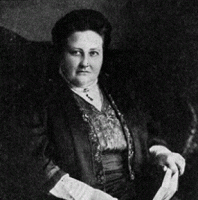
Bombs and bullets cannot menace me,
Who have no substance to be overthrown.
Cathedrals crash to rubbish, but my towers,
Carved in the whirling and enduring brain,
Fade, and persist, and rise again, like flowers.
—from “Castles in Spain” by Amy Lowell
“Bombs and bullets cannot menace me, / Who have no substance to be overthrown.” – Amy Lowell
World Poetry
Prince William Launches Poetry Competition to Find a Wilfred Owen for New Generation
Once heard, the haunting words of Wilfred Owen and his First World War contemporaries can never be forgotten, capturing all the heroism, trauma and tragedy their generation endured. A century on, the Duke of Cambridge is leading the search for a talented poet for a new era, inviting them to write their “modern-day perspective on service, conflict and humankind’s ability to overcome adversity”.
Haim Gouri, the Poet of Israel's Founding Generation, Dies at 94

Haim Gouri, a leading Israeli poet of the state's founding generation who was seen by many as the soul and conscience of the country, has died. He was 94. In a statement released after Gouri's death Wednesday, President Reuven Rivlin mourned his passing as "the national poet of our time" and a "life teacher."
Poet Richard Murphy Dies, Aged 90

Richard Murphy, the distinguished Irish poet and member of Aosdána, has died, aged 90, at his home in Sri Lanka, where he spent part of his childhood and returned to in the latter part of his life. The news was confirmed by his publisher, Cork University Press, which last year brought out his autobiography, The Kick: A Life Among Writers, which was first published in 2002 by Granta.
Haim Gouri, a leading Israeli poet of the state’s founding generation who was seen by many as the soul and conscience of the country, has died at age 94.
Recent Reviews
The Personal Is Always Political: A 2018 Poetry Preview
by Craig Morgan Teicher
Many of this year's books are sad. It's hard not to read the current political turmoil, the icy sense of dividedness, into these poems, though many of them deal as much with private as with public pain. Needless to say, this year's poetry books are powerful. This is the seventh time I've had the privilege to write for NPR about my most anticipated books of the coming year, and this time I've made a few new rules for myself (no debut collections, no poets who've appeared in a previous edition of this preview, and no poets who've published a retrospective of "selected" or "collected" poems) in the hope that I can offer a view of poets in medias res, in the midst — of their careers, their adult lives and responsibilities, of their engagement with where their public and private lives meet during this trouble and troubling moment.
Untranslatable Voices: Vickie Vértiz Writes Los Ángeles in “Palm Frond with Its Throat Cut”
By Isabel Gómez
“It’s the broken parts that matter” claims Vickie Vértiz, in a note to her poem “Nahuatl — A Revenge,” which features what she calls “imperfect” translations from the indigenous Nahuatl language into English. Vértiz’s imperfect translations recall what theorists Emily Apter and Jacques Lezra, following Walter Benjamin, call “untranslatables”: philosophical concepts that both invite and prevent transfer between languages, words that call out to be reinvented in their new language context precisely by resisting translation.
Broadsides
Remembering Nicanor Parra, the Almost Immortal Chilean Poet
by Alejandro Zambra

“He’s going to die any minute now,” a college classmate of mine said in 1994, when the Chilean poet Nicanor Parra had just turned eighty and we were eighteen. I asked if the poet was sick or something. “When people are eighty, it’s highly probable that they’ll die at any minute,” he replied. We were on campus in Santiago, doing nothing, pretty high. Someone said that there was an event at Cine Arte Alameda to celebrate Parra, and the usual four or five of us headed over—uninvited, of course, but we managed to sneak in. I remember almost nothing about the event. The place was packed. Any rock band would love to have half the fans that Parra did.
Curses and Verses: the Spoken-word Row Splitting the Poetry World Apart
by Don Paterson
O poetry! What will we do with you? You’re in the headlines again for the only reasons you ever are, ie the wrong ones. This month the poetry journal PN Review published a takedown of Hollie McNish and the spoken-word poetry scene (and of me, as McNish’s editor, in an efficient sideswipe). The debate about whether hugely popular poets such as McNish, Kate Tempest and Rupi Kaur deserve the support of the “poetic establishment” spilled out into the wider world.
Alejandro Zambra eulogized Nicanor Parra in the New Yorker.
Drafts & Fragments
TS Eliot Returns to Margate with Art Exhibition
The Waste Land inspires art exhibition in Margate, where TS Eliot wrote his poem
Mark Brown
Turner Contemporary in Margate will open an exhibition on Saturday inspired by TS Eliot’s The Waste Land. The show tells a fascinating story and also represents something of a first, in that works have not been chosen by professional curators steeped in the subject. Instead, a research group of about 60 local volunteers has spent three years getting to know the difficult but gloriously rewarding poem, choosing works that often have a personal and surprising resonance.
Collection of Sylvia Plath's Possessions to be Sold at Auction
Proof of The Bell Jar among items shedding light on poet’s life and marriage to Ted Hughes
by Maev Kennedy
The story of the last months of the life of Sylvia Plath is tracked on the flyleaves of the proof and author’s copies of her only novel, The Bell Jar. The books are inscribed in her firm, clear handwriting with addresses showing that, around the time of publication, her marriage to the poet Ted Hughes had finally collapsed and she moved with her two small children to the flat in north London where she would die in February 1963. The books are part of a collection of Plath’s possessions, including clothes, jewellery, furniture, books with loving inscriptions from Hughes, her heavily annotated cookery book, and the Hermes typewriter on which she wrote The Bell Jar, now being sold by her only surviving child, Frieda Hughes.
If You Scribble a Love Poem on an Airline Sickie Bag, EasyJet Might Give You Free Flights
by Faima Bakar
All the hopeless romantics are aboard easyJet flights it seems. The budget airliner says passionate passengers often leave loving poems scribbled on sick bags and hide them into seat pockets while flying. Oh yes, leaving sweet nothings on sick bags is the new way to people’s hearts. So if you’re the kind of romantic who likes leaving rhyme and verse for strangers to find and you also like free trips abroad, then listen up – because easyJet has a new competition that allows you to do both. Just in time for Valentine’s Day, easyJet has challenged flyers to write the loveliest poem on the bags in order to be in with a chance to win a pair of flights to anywhere on their network.
A collection of Sylvia Plath’s possessions are to be sold at auction.
Poetry In the News
Helen Dunmore Wins Costa Book of the Year for Inside the Wave

Winning for her final poetry collection, written in the last weeks of her life, Dunmore is only the second posthumous winner in the literary prize’s history
Dunmore, who died last year aged 64, is only the second posthumous winner of the book of the year category in the prize’s history, after her fellow poet Ted Hughes won for Birthday Letters in 1998, and only the eighth poetry collection to take the top award.
Parenting Columnist: Poem on NC Wall Is ‘unmitigated drivel.’ Poet: ‘Is he literate?’
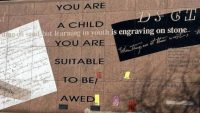
Like the high school lab partner who wakes up in the middle of a science experiment after the smoke has cleared, syndicated parenting columnist John Rosemond recently discovered the 26-year-old public art project on the side of the N.C. Department of Public Education building and declared it stupid. In a January column, Rosemond takes issue especially with the centerpiece of the 30-by-90-foot Education Wall created in 1992 by Duke University artist Vernon Pratt with design help from Carrboro writer Georgann Eubanks.The wall features a child’s drawing, several bars of a John Coltrane song and quotes about education from noted North Carolinians. In the middle is this snippet from Fred Chappell, who served as the state’s poet laureate from 1997 to 2002
US Teen Suspended after Reciting Suicide Poem at School
A US teenager's impassioned spoken word poem about her high school's perceived failures in dealing with poor mental health has resulted in her being suspended. Emily Gipson, a student at Lebanon High School in Tennessee, posted a video of herself reciting the poignant prose on YouTube, where it has garnered more than 700,000 views since being posted last week.
Winning for her final poetry collection, written in the last weeks of her life, Dunmore is the second posthumous winner in Costa Book of the Year history.
New Books
Immortal Village by Kathryn Rhett
[Paperback] Carnegie Mellon University Press,80 pp., $15.95
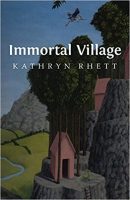
“Channeling the clear-eyed vision of Elizabeth Bishop, Rhett’s first book of poetry engages fundamental questions of travel with a steely grace. Though she says, ‘My dream is elsewhere,’ Rhett is a poet supremely rooted in places and people, in the currents of time and history. Immersed in the arresting visual iconography of art and myth, Immortal Village is an innovative book of hours and a haunting poetic debut.” —Jane Satterfield
Big Windows by Lauren Moseley
[Paperback] Carnegie Mellon University Press, 72 pp., $15.95
In this stunning debut collection, Lauren Moseley's poems move through real and imagined landscapes, navigating the borders between doubt, fear, wonder, and empowerment. Through the lens of the natural world, Moseley explores love, family, marriage, and self-knowledge, and never stops searching for the sacred, even when "the thread connecting all things" snaps. At once electric and contemplative, in a lyrical but spare style, the poems in Big Windowsultimately break down the boundaries between the self and the environment, between the physical and dream worlds, revealing the transcendent in the everyday.
Rain Scald: Poems by Tacey M. Atsitty
[Paperback] University of New Mexico Press, 88 pp., $18.95
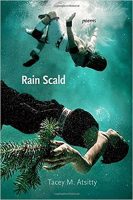
In this innovative debut collection, Tacey M. Atsitty employs traditional, lyric, and experimental verse to create an intricate landscape she invites readers to explore. Presented in three sections, Tséyi', Gorge Dweller, and Tóhee', the poems negotiate between belief and doubt, self and family, and interior and exterior landscapes.
Lake Michigan by Daniel Borzutzky
[Paperback] University of Pittsburgh Press, 88 pp., $15.95
Lake Michigan, a series of 19 lyric poems, imagines a prison camp located on the beaches of a Chicago that is privatized, racially segregated, and overrun by a brutal police force. Thinking about the ways in which economic policy, racism, and militarized policing combine to shape the city, Lake Michigan's poems continue exploring the themes from Borzutzky's Performance of Becoming Human, winner of the National Book Award for Poetry. But while the influences in this book (Césaire, Vallejo, Neruda) are international, the focus here is local as the book takes a hard look at neoliberal urbanism in the historic city of Chicago.
Tenderling by Emily Corwin
[Paperback] Stalking Horse Press, $13.99
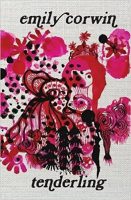
Between the thorns of the Brothers Grimm and the labyrinthine chambers of Angela Carter, Emily Corwin's first full-length collection of poems is red of tooth, claw, and lipstick. Within this vivid cycle of fabulism and erotica, of witches and absent princes, metamorphosis and dreamscapes, Corwin's work is a grimoire, a map for the territories of the unconscious. Love and madness conspire, and the modern kisses sleeping memories awake.
Channeling the clear-eyed vision of Elizabeth Bishop, Rhett’s first book of poetry engages fundamental questions of travel with a steely grace.
Correspondences
Interview with Poet Beth Copeland
by Kathryn Kopple

Today, TLY has the distinct honor of interviewing poet Beth Copeland, author of the recently released Blue Honey, which won the 2017 Dogfish Head Poetry Prize. The daughter of missionaries, Beth grew up in places far and near, and in Asia in particular. We are so glad she agreed to chat with us.
An Ethnography of the Self: Talking with Morgan Parker
by Vivian Lee
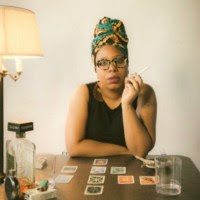
Morgan Parker is many things: writer, teacher, bathtub enthusiast, lover of philosopher, and late night drinks around a table. She is also inquisitive and openhearted, generous, and smart. I met her at Amazon Publishing, where we both worked, and quickly struck a deep friendship that evolved to being each other’s work wives. Last February, Parker published her second book of poems, There Are More Beautiful Things than Beyoncé, which was named a best book in publications like the Paris Review, Time, NPR, and BuzzFeed—and here at The Rumpus. Not long ago, on an unseasonably cool New York afternoon and an unseasonably hot Los Angeles morning, Morgan and I talked by phone about craft, black America, and, of course, feelings.
Morgan Parker is many things: writer, teacher, bathtub enthusiast, lover of philosopher, and late night drinks around a table.
Envoi: Editor’s Notes
Pro Patria
I am glad that Prince William has taken up the cause to promote poetry. (see the article above). His A Poem to Remember competition is “intended to honour and convey the challenges faced by current serving men and women, and their families.”
And coming as it does on the centenary of the end of World War One, it is designed, in his words “to find a new poem that, inspired by those earlier works, will have its own modern-day perspective on service, conflict and humankind’s ability to overcome adversity.”
It is there that I find difficulty with the concept. As much as the prince might extoll the virtues and sentiments of the war poets, I sense he doesn’t fully grasp the fuller implications of their verse, especially of the most famous of that genre, written by Wilfred Owen (whose association is supporting the competition effort).
Rather than a reminder of their “great work and sacrifice, Owen’s “Dulce et Decorum Est” is above all a fierce anti-war poem, which states baldly that the noble idea of ultimate sacrifice to the state is a bitter lie propagated by those who have not seen the damage done.
In case there’s any doubt, here’s Owen’s masterful double sonnet:
Dulce et Decorum Est
Bent double, like old beggars under sacks,
Knock-kneed, coughing like hags, we cursed through sludge,
Till on the haunting flares we turned our backs,
And towards our distant rest began to trudge.
Men marched asleep. Many had lost their boots,
But limped on, blood-shod. All went lame; all blind;
Drunk with fatigue; deaf even to the hoots
Of gas-shells dropping softly behind.
Gas! GAS! Quick, boys!—An ecstasy of fumbling
Fitting the clumsy helmets just in time,
But someone still was yelling out and stumbling
And flound’ring like a man in fire or lime.—
Dim through the misty panes and thick green light,
As under a green sea, I saw him drowning.
In all my dreams before my helpless sight,
He plunges at me, guttering, choking, drowning.
If in some smothering dreams, you too could pace
Behind the wagon that we flung him in,
And watch the white eyes writhing in his face,
His hanging face, like a devil’s sick of sin;
If you could hear, at every jolt, the blood
Come gargling from the froth-corrupted lungs,
Obscene as cancer, bitter as the cud
Of vile, incurable sores on innocent tongues,—
My friend, you would not tell with such high zest
To children ardent for some desperate glory,
The old Lie: Dulce et decorum est
Pro patria mori.
PS. Wilfred Owen was killed in action one week prior to the Armistice in November 1918. He was twenty-five.
PNIR editor David Sanders reflects on Prince William’s decision to promote poetry.